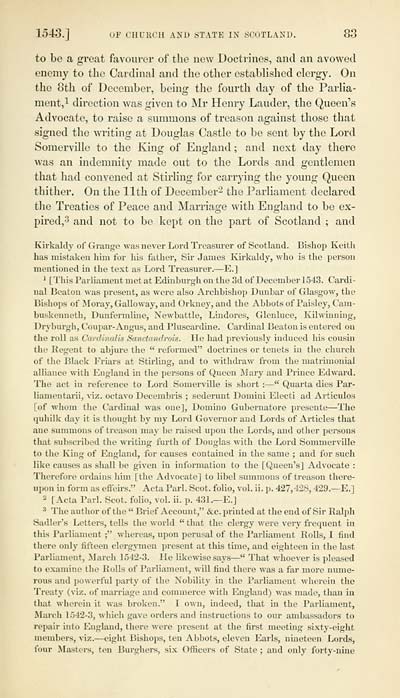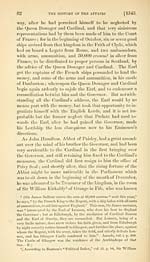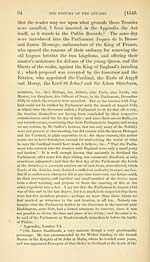Spottiswoode Society > History of the affairs of the Church and State of Scotland from the beginning of the reformation to the year 1568 > Volume 1
(219) Page 83
Download files
Complete book:
Individual page:
Thumbnail gallery: Grid view | List view

1543. j OF CHURCH AND STATE IN SCOTLAND. 83
to be a great favourer of the new Doctrines, and an avowed
enemy to the Cardinal and the other established clergy. On
the 8th of December, being the fourth day of the Parlia-
ment, 1 direction was given to Mr Henry Lauder, the Queen's
Advocate, to raise a summons of treason against those that
signed the writing at Douglas Castle to be sent by the Lord
Somerville to the King of England ; and next day there
was an indemnity made out to the Lords and gentlemen
that had convened at Stirling for carrying the young Queen
thither. On the 11th of December 2 the Parliament declared
the Treaties of Peace and Marriage with England to be ex-
pired, 3 and not to be kept on the part of Scotland ; and
Kirkaldy of Grange was never Lord Treasurer of Scotland. Bishop Keith
has mistaken him for his father, Sir- James Kirkaldy, who is the person
mentioned in the text as Lord Treasurer. — E.]
1 [This Parliament met at Edinburgh on the 3d of December 1543. Cardi-
nal Beaton was present, as were also Archbishop Dunbar of Glasgow, the
Bishops of Moray, Galloway, and Orkney, and the Abbots of Paisley, Ciim-
buskenneth, Dunfermline, Newbattle, Lindores, Glenluce, Kilwinning,
Drybnrgh, Coupar- Angus, and Pluscardine. Cardinal Beaton is entered on
the roll as Cardinalis Sanctundrois. He had previously induced his cousin
the Regent to abjure the " reformed" doctrines or tenets in the church
of the Black Friars at Stirling, and to withdraw from the matrimonial
alliance with England in the persons of Queen Mary and Prince Edward.
The act in reference to Lord Somerville is short : — " Quarta dies Par-
liamentary, viz. octavo Decembris ; sederunt Domini Electi ad Articulos
[of whom the Cardinal was one], Domino Gubernatore presente — The
quhilk day it is thought by my Lord Governor and Lords of Articles that
aue summons of treason may be raised upon the Lords, and other persons
that subscribed the writing furth of Douglas with the Lord Sommerville
to the King of England, for causes contained in the same ; and for such
like causes as shall be given in information to the [Queen's] Advocate :
Therefore ordains him [the Advocate] to libel summons of treason there-
upon in form as effeirs." Acta Pari. Scot, folio, vol. ii. p. 427,428, 429.— E.]
2 [Acta Pari. Scot, folio, vol. ii. p. 431.— E.]
3 The author of the " Brief Account," &c. printed at the end of Sir Ralph
Sadler's Letters, tells the world " that the clergy were very frequent in
this Parliament ;" whereas, upon perusal of the Parliament Rolls, I find
there only fifteen clergymen present at this time, and eighteen in the last
Parliament, March 1542-3. He likewise says — " That whoever is pleased
to examine the Rolls of Parliament, will find there was a far more nume-
rous and powerful party of the Nobility in the Parliament wherein the
Treaty (viz. of marriage and commerce with England) was made, than in
that wherein it was broken." I own, indeed, that in the Parliament,
March 1542-3, which gave orders and instructions to our ambassadors to
repair into England, there were present at the first meeting sixty-eight
members, viz. — eight Bishops, ten Abbots, eleven Earls, nineteen Lords,
four Masters, ten Burghers, six Officers of State ; and only forty-nine
to be a great favourer of the new Doctrines, and an avowed
enemy to the Cardinal and the other established clergy. On
the 8th of December, being the fourth day of the Parlia-
ment, 1 direction was given to Mr Henry Lauder, the Queen's
Advocate, to raise a summons of treason against those that
signed the writing at Douglas Castle to be sent by the Lord
Somerville to the King of England ; and next day there
was an indemnity made out to the Lords and gentlemen
that had convened at Stirling for carrying the young Queen
thither. On the 11th of December 2 the Parliament declared
the Treaties of Peace and Marriage with England to be ex-
pired, 3 and not to be kept on the part of Scotland ; and
Kirkaldy of Grange was never Lord Treasurer of Scotland. Bishop Keith
has mistaken him for his father, Sir- James Kirkaldy, who is the person
mentioned in the text as Lord Treasurer. — E.]
1 [This Parliament met at Edinburgh on the 3d of December 1543. Cardi-
nal Beaton was present, as were also Archbishop Dunbar of Glasgow, the
Bishops of Moray, Galloway, and Orkney, and the Abbots of Paisley, Ciim-
buskenneth, Dunfermline, Newbattle, Lindores, Glenluce, Kilwinning,
Drybnrgh, Coupar- Angus, and Pluscardine. Cardinal Beaton is entered on
the roll as Cardinalis Sanctundrois. He had previously induced his cousin
the Regent to abjure the " reformed" doctrines or tenets in the church
of the Black Friars at Stirling, and to withdraw from the matrimonial
alliance with England in the persons of Queen Mary and Prince Edward.
The act in reference to Lord Somerville is short : — " Quarta dies Par-
liamentary, viz. octavo Decembris ; sederunt Domini Electi ad Articulos
[of whom the Cardinal was one], Domino Gubernatore presente — The
quhilk day it is thought by my Lord Governor and Lords of Articles that
aue summons of treason may be raised upon the Lords, and other persons
that subscribed the writing furth of Douglas with the Lord Sommerville
to the King of England, for causes contained in the same ; and for such
like causes as shall be given in information to the [Queen's] Advocate :
Therefore ordains him [the Advocate] to libel summons of treason there-
upon in form as effeirs." Acta Pari. Scot, folio, vol. ii. p. 427,428, 429.— E.]
2 [Acta Pari. Scot, folio, vol. ii. p. 431.— E.]
3 The author of the " Brief Account," &c. printed at the end of Sir Ralph
Sadler's Letters, tells the world " that the clergy were very frequent in
this Parliament ;" whereas, upon perusal of the Parliament Rolls, I find
there only fifteen clergymen present at this time, and eighteen in the last
Parliament, March 1542-3. He likewise says — " That whoever is pleased
to examine the Rolls of Parliament, will find there was a far more nume-
rous and powerful party of the Nobility in the Parliament wherein the
Treaty (viz. of marriage and commerce with England) was made, than in
that wherein it was broken." I own, indeed, that in the Parliament,
March 1542-3, which gave orders and instructions to our ambassadors to
repair into England, there were present at the first meeting sixty-eight
members, viz. — eight Bishops, ten Abbots, eleven Earls, nineteen Lords,
four Masters, ten Burghers, six Officers of State ; and only forty-nine
Set display mode to: Large image | Transcription
Images and transcriptions on this page, including medium image downloads, may be used under the Creative Commons Attribution 4.0 International Licence unless otherwise stated. ![]()
| Permanent URL | https://digital.nls.uk/79599416 |
|---|
| Description | Volume I. |
|---|---|
| Attribution and copyright: |
|

